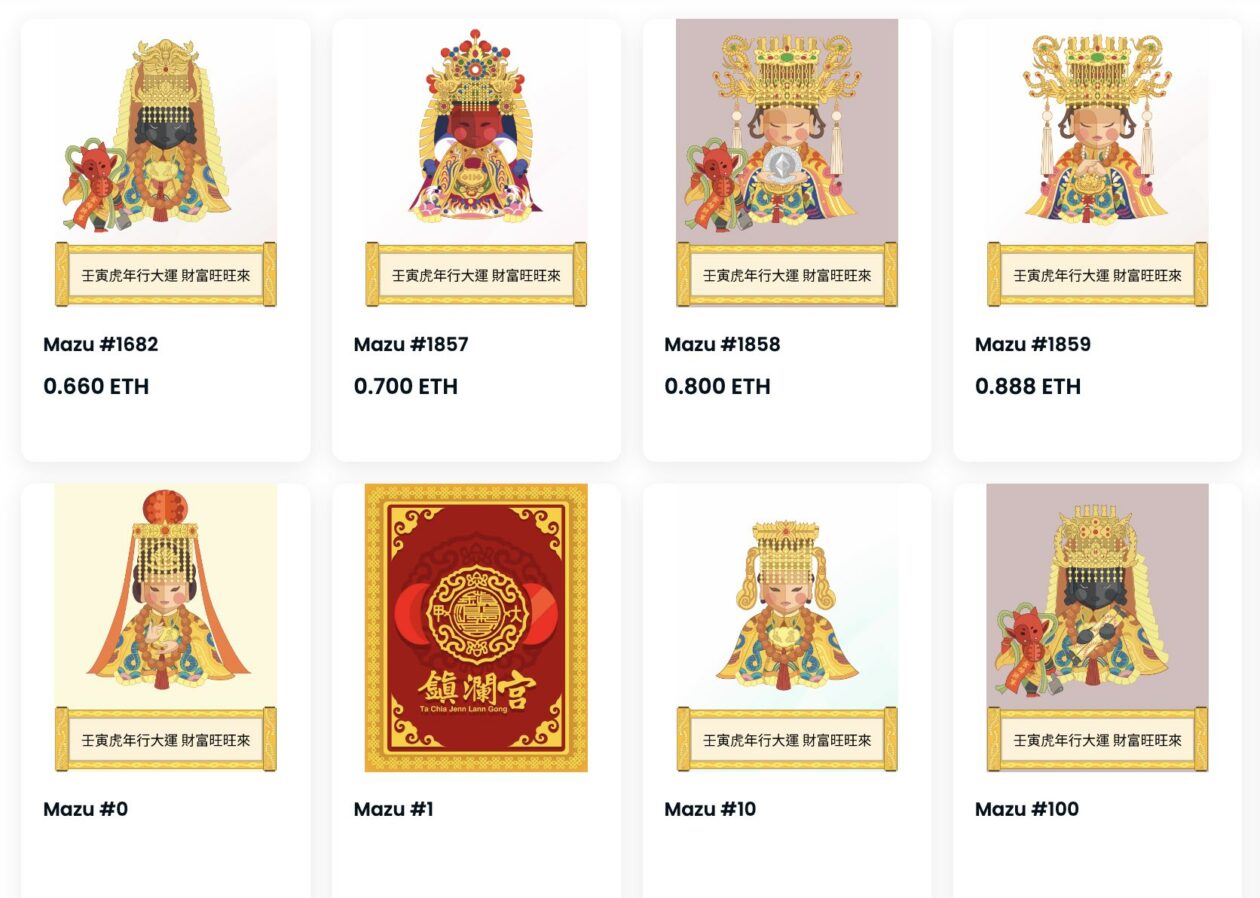The Chinese sea goddess Mazu is big business in Taiwan and the blockchain could make it even bigger.
The Mazu deity, known as a protector of seafarers and worshiped by Chinese communities around the world for centuries, is especially popular in Taiwan. The Dajia Jenn Lann Temple in Taichung city organizes an annual 300-kilometer nine-day pilgrimage with a statue of the goddess that draws hundreds of thousands of followers.
The pilgrimages and related festivals have formed what is known as the “Mazu economy,” referring to donations and spending on Mazu-themed merchandise and business opportunities surrounding the religion.
Dajia Jenn Lann Temple, which dates back to the Qing Dynasty in the 1700s, has decided to add a Web 3.0 element to its activities. It’s minting and selling sea goddess non-fungible tokens (NFTs) that act as a priority pass for the pilgrimage that usually happens in the Spring.
The MazuDAO NFTs went on sale in August at NT$ 18,880 (US$615) through the temple’s e-commerce platform MazuBuyBuy and elsewhere. So far, the temple has minted and sold more than 2,800 NFTs.
“According to estimates the nine-day pilgrimage can generate more than NT$5 billion (US$163 million) in spending. On the day when Mazu returned to the home temple, we saw about 500,000 people joining the pilgrimage,” Mingkun Cheng, vice chairman of the board of the Dajia Jenn Lann Temple, told Forkast.
More younger people are joining the pilgrimage so the MazuDAO NFTs appeal to them, said Cheng.

Online gods?
Many traditional cultural activities are adapting to digital and technological innovation, Mao-Hsien Lin, an associate professor of National Taichung University of Education’s Taiwanese languages and literature department, told Forkast.
However, Lin, who researches Mazu religion, said many elder followers are not so sure about the developments.
“They prefer the physical touch and the direct contact with the statue of the deities,” Lin said. They are not so sure that if they worship online that the deities are also online to hear their prayers.
However, Lin said the pilgrimage priority perk for NFT holders might not be too attractive for traditional believers.
“Typically when we pray, the distance between you and the statue doesn’t really matter. It’s not like you’d get special treatment if you’re closer,” he added. “It’s becoming a bit too commercialized.”
To tap into the market of traditional believers, the NFT project team organized offline marketing campaigns — an approach different from most NFT projects that prioritize online marketing channels.
Jerry Yan, project lead of MazuDAO, told Forkast that many elder followers didn’t even have a smartphone and “very much live in a Web 0.0 world.”
“We had to set up promotional booths in front of the temple to introduce MazuDAO NFTs to those Web0 believers,” Yan said, adding they also needed a landline customer service team because it was the only way to reach older temple followers.
“Often on the phone, we’d ask them to call for their grandchildren to help out and set up crypto wallets on their behalf.”

Commercial Mazu
Cheng said that the temple has authorized some online vendors to use its Mazu intellectual property to make merchandise for sale on its e-commerce platform MazuBuyBuy.
Lin the researcher said Mazu has become a highly-commercialized intellectual property in Taiwan, with Mazu-themed merchandise in convenience stores and on major online shopping sites.
“Again, I think a large part of the essence of religion lies in offering that mental comfort for believers. It’s not necessarily a good thing if it gets too commercialized,” Lin said. “If we see the deity as a business generator, it would lose a sense of divinity.”
Still, Cheng of the Dajia Jenn Lann Temple said the temple’s annual pilgrimages have attracted an increasing number of younger people and many post videos of the festival and the pilgrimage on social media platforms such as Instagram and YouTube.
A Korean YouTuber based in Taiwan (known as Korean Kimchengu, literally “Korean enoki mushroom”) joined the pilgrimage last year and made a video that has gained over 580,000 views.
Logan Beck, an American YouTuber based in Taiwan, also uploaded a video of the 2021 pilgrimage, which now has more than 405,000 views.
Read More: news.google.com









 Bitcoin
Bitcoin  Ethereum
Ethereum  XRP
XRP  Tether
Tether  Solana
Solana  Dogecoin
Dogecoin  USDC
USDC  Cardano
Cardano  Lido Staked Ether
Lido Staked Ether  TRON
TRON  Avalanche
Avalanche  Wrapped stETH
Wrapped stETH  Sui
Sui  Chainlink
Chainlink  Toncoin
Toncoin  Shiba Inu
Shiba Inu  Stellar
Stellar  Wrapped Bitcoin
Wrapped Bitcoin  Hedera
Hedera  Polkadot
Polkadot  WETH
WETH  Bitcoin Cash
Bitcoin Cash  Uniswap
Uniswap  Pepe
Pepe  Litecoin
Litecoin  Hyperliquid
Hyperliquid  LEO Token
LEO Token  Wrapped eETH
Wrapped eETH  NEAR Protocol
NEAR Protocol  Ethena USDe
Ethena USDe  USDS
USDS  Internet Computer
Internet Computer  Aptos
Aptos  Aave
Aave  Render
Render  Mantle
Mantle  Bittensor
Bittensor  POL (ex-MATIC)
POL (ex-MATIC)  Cronos
Cronos  Ethereum Classic
Ethereum Classic  Artificial Superintelligence Alliance
Artificial Superintelligence Alliance  Virtuals Protocol
Virtuals Protocol  MANTRA
MANTRA  WhiteBIT Coin
WhiteBIT Coin  Arbitrum
Arbitrum  Monero
Monero  Tokenize Xchange
Tokenize Xchange